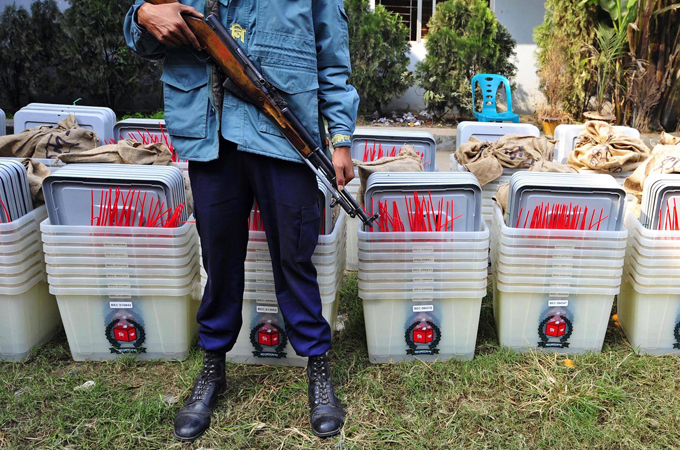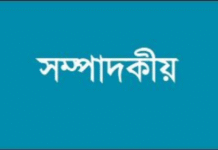by Zia Hassan
Faced with an impotent opposition, the Awami League carries on with impunity.
“In death, Kadambini proved she had indeed been alive.” This popular line from the ending of a Tagore novel comes to mind as the aftermath of the January 5th elections proves how the opposition’s call for a caretaker government to oversee elections had been right.
The new government, however, has very little time to dwell in literary similes. Awami League has by now won 231 seats and the rest was allocated to handpicked parties to construct an opposition party. Among these 231 seats, 154 were won before any votes were cast due to lack of contestation.
Not so credible poll
On election day, TVs were reporting as little as 10 to 20 votes from the polling booths until noon, and in one instance, broadcast bored election officials getting haircuts. Facebook was abuzz with jokes about the state minister who theorised that the people were not coming to vote due to the cold weather. The abysmal turnout persisted throughout the day. However, by the evening, the election commission reported a 30-40 percent turnout rate, which seemed incredulous in light of the visible lack of voters throughout the country. No doubt that Bangladeshis and the international community, with the exception of India, were in unison in condemning the poll that deprived people of their right to choose.
This is a big deal for Bangladesh. It has turned into a tradition that people remain silent about the injustices committed during the ruling party’s entire tenure and make their voice heard in ballot boxes. Along with other deeply rooted political traditions in the country, no incumbent has been re-elected in the 42 years history of Bangladesh – never through a free and fair election, that is. But, the current government has successfully interrupted the pattern and appears undisturbed by all the criticism about the manner in which it achieved its goal.
The election commission has declared the polls a success, with a 30 percent turnout rate. But that has only served to prove how incapable Bangladeshi politicians are of conducting a legitimate poll under their own auspices, which in turn further legitimises the movement for conducting elections under a caretaker government.
Even hard core government supporters appear to be apologetic about this embarrassing affair. They are saving face by claiming that this poll had to be carried out to fulfil constitutional obligations and that a new election will very soon be called following new dialogue with the opposition.
Insolent government
Sheikh Hasina, the supremo of the Awami League, along with the top leadership of the party, are probably not looking at the future in the same way. They seem to be fully prepared to trudge on for another five years, and undeniably possess the political acumen to counter any form of local or international pressure. It is no coincidence that an influential aide to the government, was caught whispering in an open microphone at a press conference, advising the prime minister on how to deal with allegations of irregularities from the reporters.
Those who have closely observed the government will know that Awami League means business when it comes to Bangladeshi politics. And, they are under no obligation to accept that this poll is illegitimate and unfair, although the credibility of the newly formed government is bound to be called into question. There are also expectations that there will be local and international pressure for another round of elections. But the Awami League government is well poised to play on their own terms – a situation which, judging by all signs, including surveys and previously held polls, will mean the dethroning of the current government.
At the same time, the government is structurally, financially, and organically ready to crush any opposition and to continue with their rule for the full term. Supported by a dogmatic ideology and a significant portion of the population, the ruling party is likely to continue with its strategy. Anohter major disappointment had been the War Crimes Tribunal that turned out to be a potent tool for the government to avert criticism.
Floundering opposition
On the other hand, BNP, the main opposition, (which some diplomats have jokingly called Basically No Party among themselves) is a structurally weak organisation. BNP leader Begum Khaleda Zia appears physically unwell to carry out a movement. She appears to be dependent on her aides who have been barred from seeing her since she is under virtual house arrest. Her son, Tariq Zia, lives in exile in London and seldom makes public appearances, rendering BNP a rudderless organisation.
The party was also weakened by the arrest of its senior leaders. Many claim that the opposition’s protest activities are basically being carried out by Jamal-e-Islamic and its student wing, not by BNP activists.
Under these circumstances, BNP is too powerless to force the government to hold new elections.
The problem for BNP is that although it is considered a natural replacement to Awami League as per Bangladesh duopoly, its own activities and polices raise valid questions about its moral right to be successor to the throne when vacated by Awami League. It is a party that has been elected twice and was overwhelmingly rejected by the people after its last tenure. However, the party’s decision-makers seem to have learnt little and in recent times have inflamed the people by adopting violent tactics of targeting the common people during anti-government protests.
Before election day nearly 500 schools scheduled to be polling locations, were burnt down, allegedly by opposition cadres, to the utter dismay of people from across the spectrum. They have regularly torched transport vehicles and killed people who defy the blockade for their livelihoods. There were also attacks on religious minority communities in a number of places immediately after the vote, allegedly carried out by Jamat-e-Islami, its student wing and the BNP. However, in some instances the leaders of the Hindu-Buddhist-Christian alliance have laid blame [Bn] on government supporters.
Population in crossfire
Bangladesh is now stuck in a quagmire from which there is no visible way out. Awami League leaders will not, in any way, accept a situation where they might have to face a poll free of their influence and they will continue to run their government until a compromise has been achieved on their terms.
On the other hand, BNP and its allies will continue to call blockades, strikes and go on with the destruction of public property until the government hands over power to a neutral caretaker government for another round of elections. The consequences of people’s suffering has already started to show.
Farmers are unable to ship their winter produce which is rotting in their fields, the unskilled workers and daily labourers and their families – a large chunk of the population -are struggling to make ends meet due to lack of jobs; school are closed for an indefinite period; businesses, big and small, are shedding jobs or not paying their staff. It is a miserable scenario to which the government-controlled media are not drawing attention. You can only hear grumbles of dissent and stories of suffering when you walk into the streets and speak to the people.
Bangladesh is a nation of 155 million resilient people who have learnt to live their lives on very little despite the destructive cyclones, floods and other natural calamities. People have learnt to live their lives bypassing periodic political violence as well. But, this time it appears to be going too far and too long even for them to bear.
Zia Hassan is a political and cultural analyst. He writes in local and international blogs and social media outlets.
The views expressed in this article are the author’s own and do not necessarily reflect Al Jazeera’s editorial policy.
Source: Aljazeera










